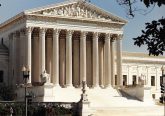Highlights from the Supreme Court’s oral arguments in Dobbs v. Jackson Women’s Health
Washington D.C., Dec 1, 2021 / 07:15 am
This post will be continuously updated.
As the Supreme Court is set to hear arguments in the case Dobbs v. Jackson Women’s Health, activists both opposed and in favor of abortion rights gathered outside the court in the early morning hours on Wednesday, Dec. 1.
CNA is outside the court and will be providing on-the-ground updates. (All times EST.)
11:55 a.m. The Supreme Court adjourns.
11:54 a.m. In his closing rebuttal, Stewart compared Dobbs v. Jackson Women’s Health to Brown v. Board of Education.
“In closing, I would say that in the dissent of Plessy v. Ferguson, Justice Harlan emphasized that there is no caste system here; and the humblest in our country is the peer of the most powerful. Our Constitution neither knows nor tolerate distinctions on the basis of race,” he said.
“It took 58 years for this court to recognize the truth of those realities in a decision. And that was the greatest decision that this court ever reached. We’re we’re running on 50 years of Roe. It is an egregiously wrong decision that has inflicted tremendous damage on our country, and will continue to do so and take innumerable human lives,” until it is overruled.
11:48 a.m. Prelogar states that she does not think “there’s any line that could be more principled than viability.”
“I think the factors the court would have to think about are what is most consistent with precedent, what would be clear and workable, and what would preserve the essential components of the liberty interest,” she said. “Viability checks all of those boxes, and has the advantage as well as being a rule of law for 50 years.”
11:33 a.m. “Shout Your Abortion” shares a video of women allegedly taking Mifepristone, the first drug in a two-drug abortion regimen, to cheers in front of the Supreme Court.
Mifepristone blocks the hormone progesterone from reaching the unborn child, and is used to terminate pregnancies under 10 weeks gestation.
11:26 a.m. U.S. Solicitor General Elizabeth B. Prelogar begins her arguments in support of Jackson Women’s Health.
11:25 a.m. Rikelman has ended her arguments.
11:20 a.m. Justice Brett Kavanaugh notes that “when you really dig into it, history tells a somewhat different story” regarding stare decisis.
“I think that is sometimes assumed if you think about some of the most important cases, the most consequential cases in this court’s history, there’s a string of them where the cases overruled precedent,” said Kavanaugh, singling out Brown v. Board of Education, Lawrence v. Texas, and Miranda v. Arizona as examples.
11:15 a.m. Alito questions Rikelman about the historical precedent in Roe/Casey. He asked if states had recognized abortion at the time of the 14th Amendment–there were none, said Rikelman, but says there was “common law.”
Rikelman could not provide a case recognizing abortion as a right.
11:06 a.m. Alito calls the viability line “arbitrary,” and says that it does not make sense.
“If a woman wants to be free of the burdens of pregnancy, that interest does not disappear the moment the viability line is crossed,” said Alito. “The fetus has an interest in having life, and that doesn’t change.”
10:56 a.m. Justice Amy Coney Barrett questions Rikelman about “safe haven” laws, which permit a woman to terminate parental rights by placing the child for adoption shortly after they are born.
Rikelman notes that this case is not just about parenthood, and says pregnancy is potentially dangerous.
10:53 a.m. Chief Justice John Roberts asked Rikelman if a 15-week line could be more workable as a legal standard than viability.
“It seems to me that (viability) doesn’t have anything to do with choice,” said Roberts. “If it really is an issue about choice, why is 15 weeks not enough time?”
Rickelman said it would not, as enacting a pre-viability line would result in states moving to ban abortions earlier and earlier in a pregnancy.
10:46 a.m. Julie Rikelman, senior director of the Center for Reproductive rights, begins her arguments before the court.
“Casey and Roe were correct,” she says. She added that there is an “an especially high bar here” as the Supreme Court rejected “every possible reason” for overturning Roe when it decided Casey.
“Mississippi’s ban on abortion two months before viability is flatly unconstitutional under decades of precedent, ” said Rikelman. “Mississippi asks for the court to dismantle this precedent and allow states to force women to remain pregnant and give birth against their will.”
10:31 a.m. Justice Samuel Alito questions Stewart regarding the idea that being pro-life is a religious view only, and asks if any secular bioethicists believe life exists prior to viability.
“It’s not tied to a religious view,” says Stewart, who said that there are a host of secular people who have differing views on when life begins.
10:12 a.m. Justices Stephen Breyer and Elena Kagan are pressing Stewart on the issue of stare decisis.
Here’s a breakdown about why this legal concept is so pivotal in the Dobbs case.
10:03 a.m.
Roe v. Wade and Planned Parenthood v. Casey “have no basis in the Constitution,” said Stewart. “They have no home in our history or traditions. They’ve damaged the democratic process. They poison the law. They’ve choked off compromise for 50 years.”
Stewart said those cases have “kept this court at the center of a political battle that it can never resolve.”
“Nowhere else does this court recognize a right to end a human life,” he said.
10 a.m. Oral arguments will be starting momentarily. Video is not available, but an audio recording is provided by C-SPAN. Listen live here.
9:50 a.m. Arguments are set to begin in 10 minutes, and are scheduled to last 70 minutes. Normally, reporters and members of the public would be permitted to observe arguments, but the ongoing COVID-19 pandemic has put a stop to this practice.
Scott G. Stewart, the solicitor general of Mississippi, will have 35 minutes to represent the state.
For Jackson Women’s Health Organization, Julie Rikelman, litigation director of the Center for Reproductive Rights, will have 20 minutes. U.S. Solicitor General Elizabeth B. Prelogar will also have 15 minutes to argue in support of Jackson Women’s Health Organization.
The crowd outside the court continues to swell as the “Empower Women, Promote Life” rally goes on.
9:02 a.m. This is Marion, from Mississippi. She told CNA that she remembers Roe v. Wade, and says that her generation allowed it to happen. That’s why, she said, her generation must also work to reverse it.
The Supreme Court first heard arguments in Roe v. Wade on Dec. 13, 1971, almost exactly 50 years ago. The case was then re-argued in front of the court on Oct. 11, 1972, and the court announced their decision in the case on Jan. 22, 1973.
8:33 a.m. Mississippi Attorney General Lynn Fitch said today is a “new chapter in American history, leaving behind the false premise that abortion levels and the playing field for women.”
8:00 a.m.: It’s a chilly 36 degrees, but people have assembled in front of the Supreme Court. A fence serves as a physical barrier between the two opposing groups.












